
6 Proven Social Media Engagement Strategies for 2024
Success on social media is all about engagement – that magical connection between your brand and your audience. Beyond mere metrics, engagement stands as a qualitative testament to your brand's influence, loyalty, and potential for conversion.
In a sea of cat videos and memes inundating feeds, transcending the superficial and fostering genuine interactions is paramount. Think of engagement as the key that turns a passive audience into an involved community. Establishing a presence or sharing fun content isn't enough; you have to cultivate a meaningful two-way conversation.
At BrandBastion, we have analyzed the engageable comments from 20 popular brands across multiple industries from July 2023 - December 2023 to unravel how to reply to customers on social media successfully. Get ready to optimize your own response strategy further!
| Download the PDF version for free. Click here. |
Jump to:
-
Reply to FAQ Comments: Diversify Responding Options
-
Boost Fan Community Comments: Engage Authentically with Your Fans
-
Discover the Most Common Engageable Comments: #1 Fan Community
Message tagging is crucial for social media engagement because it helps brands analyze and manage conversations more effectively. This practice involves classifying social media comments and messages with tags. It gives brands a structured way to organize and understand the diverse interactions happening within their online community.
The following table summarizes our main categories of engageable comments:
| Category | Description | Comment Example |
|---|---|---|
| Fan Community comments | Positive reviews or comments about the brand, products, or service. | "Loveeee @brand! Have used for years! 😍thanks for sharing 🤍" |
| Basic Customer complaints | Comments expressing negative experiences or issues that the Customer Service team can resolve. | "Just tried to book some sessions but site wouldn't accept my card!" |
| Escalated Customer complaints | Comments showing extreme frustration or exhaustion with previous contact attempts to support. | "Worst customer service experience. I have been trying to cancel my subscription for weeks and you have not been helpful at all!!!! I’m still trying!!! 😭" |
| Constructive feedback | General customer feedback on experiences with the brand, products, and services. | "PLEASE make monthly payments available." |
| FAQs | Questions related to frequently asked topics such as pricing, availability, shipping, etc. | "How much does this cost?" |
| Purchase Intent | Comments expressing interest or intent to purchase, seeking information about the product or service. | "Need to try these 😍😍" |
Now that we've laid out these categories of engageable comments, let's dive into what our analysis uncovered. On average, brands find the most interaction in the "Fan Community" category, whereas "Escalated Customer Complaints" tend to be the least common form of engagement.
Among the analyzed brands, 95% respond to frequently asked questions (FAQs), but only 40% address Escalated Customer Complaints. This suggests room for improvement, as a more thorough way of handling escalated concerns could improve overall customer satisfaction.
Notably, while a few brands reply to Escalated Customer Complaints, 90% of brands reply to Basic Customer Complaints. This suggests a recognition of the significance of promptly resolving actionable complaints and service issues.
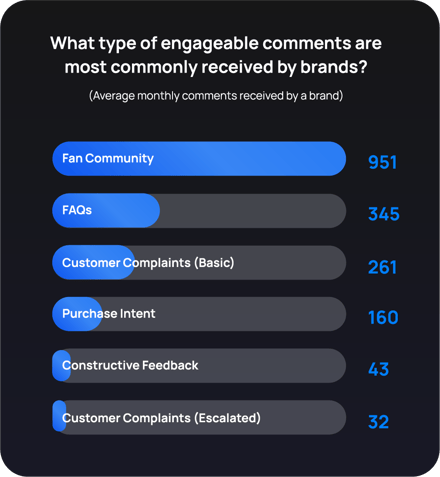
Address Customer Complaints Comments: Be Public & Private At the Same Time
Dealing with customer complaints on social media platforms is crucial because it directly affects brand reputation, customer loyalty, and overall business success. Dive deeper into the impact of negative reviews on sales by checking out this blog post.
Here's our recommendation on how to reply to complaints on social media and ensure excellent customer service:
- Respond publicly to build trust and strengthen positive brand perception. Responsiveness showcases a commitment to customer satisfaction, fostering trust and loyal customers.
- Move the conversation to the private domain to address personal issues in depth. This way, you protect customers from disclosing sensitive customer information publicly on social media channels.
Another common practice we see within our clients is to hide and reply to customer complaints only privately. This is to avoid any potential impact of negative experiences on a customer's journey.
|
75% of brands opt to hide customer complaints comments* *excluding Twitter (where users can see hidden comments) and platforms where you can only delete (like LinkedIn) |
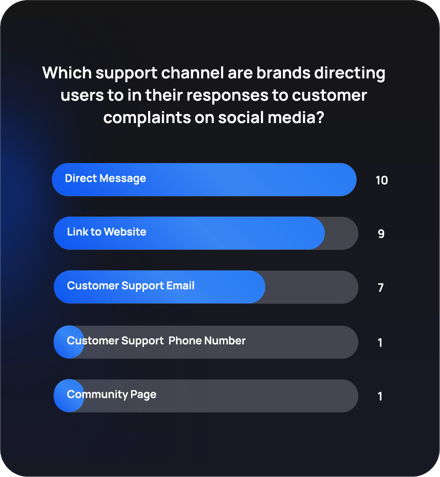
Reply to FAQ Comments: Diversify Responding Options
Responding promptly to common queries demonstrates transparency, reliability, and a commitment to customer support. It enhances the customer experience by offering quick access to information right in social media posts or ads, fostering positive experiences and reducing frustration.
-
Set up multiple FAQ Topics to tailor brand responses to user's needs. To cater to users' specific needs or interests, brands should establish multiple FAQ topics. Popular categories include Pricing, General Questions, and Queries about Specific Products or Campaigns. Notably, there's a growing interest in Sustainability/Organic/Vegan topics, making them increasingly common choices among brands.
-
Amplify response variety for each FAQ topic. To efficiently engage on a larger scale in real-time, brands often use templated responses. However, given the increasing demand for authenticity on social media, we recommend adopting a broader approach. Our advice is for brands to develop at least ten unique variations for each FAQ topic.
| Our statistics shows that on average, a FAQ topic has 15 variations of responses. |
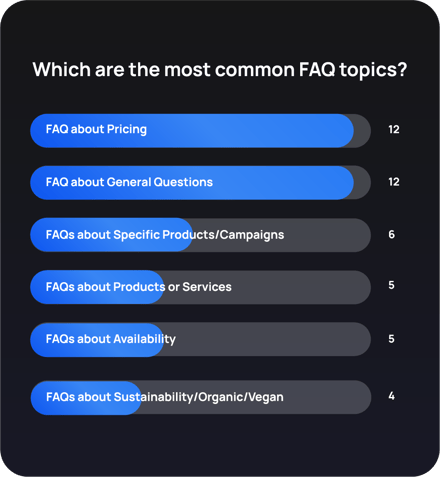
Boost Fan Community Comments: Engage Authentically with Your Fans
Responding to positive customer engagement encourages users to be more engaged, fostering a loyal and inspired community across your social networks.
Fan community comments serve as an initial form of social proof by showcasing genuine interactions and positive customer sentiment. This strengthens the brand's credibility and builds a stronger customer relationship.
This is how social media managers can reply to compliments on social media:
-
Be authentic to your brand voice
-
Reflect your brand personality
-
Include emojis that are consistent with the brand voice and target audience interactions
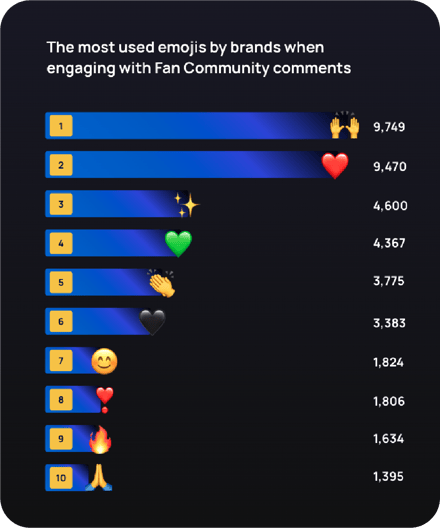
Leverage Purchase Intent Comments: Direct Users to the Next Step to Increase Sales
Brands should reply to Purchase Intent comments to turn potential customers into actual buyers, which is important for their success. These comments express a clear interest in the brand's products or services, showcasing a readiness to make a purchase.
By paying attention to interested users and quickly providing helpful information or guidance, brands can positively impact decision-making and expand their customer base.
-
88% of brands responding to this comment category direct users to their website for more information on the product/service, how to start or where to purchase them.

-
Additionally, half of the responding brands (44%) engage positively with users showing purchase intent.

-
Some retail or e-commerce brands use personalized strategies, giving customized recommendations and sharing direct links to suggested products.

Acknowledge Constructive Feedback Comments: Be Grateful, Listen and Strive to be Better
Regardless of the nature of the feedback, brands should express gratitude for constructive comments, whether positive or negative, and emphasize that they value users' opinions. Make customers feel acknowledged, and demonstrate a commitment to considering their feedback for improvement. Additionally, gathering analytics on such comments is crucial, as they often contain valuable insights for enhancing products, services, or creativity.
This is how brands can reply to negative comments on social media with constructive feedback:
-
Many brands opt for generic responses that could fit different situations:
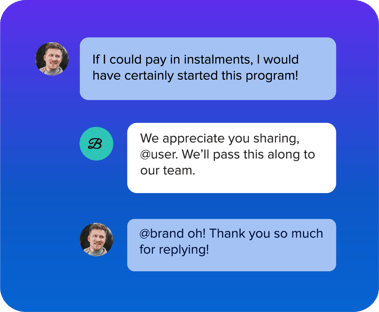
-
Sometimes brands use specific responses if they find a high number of feedback for specific use cases:
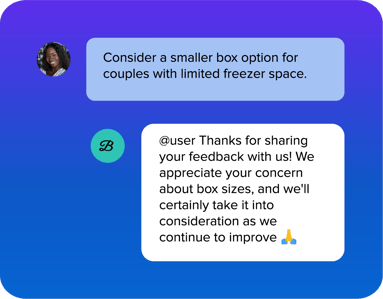
-
Utilizing AI and saved replies can help brands customize their responses effectively:
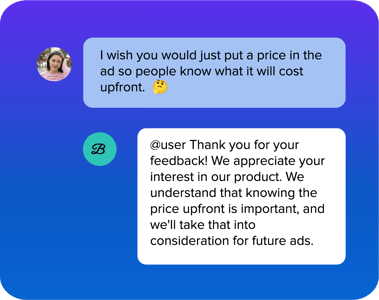
Social Media Engagement Strategies:
|
Ready to start engaging with your community at scale?
Our 24/7 community management services ensure your brand stays connected with your audience, while our smart social media inbox empowers you to streamline in-house engagement efforts.
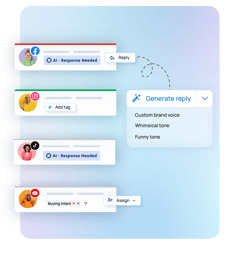
AI-Powered Community Management Platform
Intent recognition & customized AI-generated replies
START FREE TRIALFree trial. No credit card required.